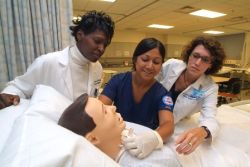Expanding Professional Development at the Medical College of Georgia
The first and only of its kind in-state, the Clinical Nurse Leader (CNL) program at the Medical College of Georgia (MCG) was created to develop nurse leaders who will enter the workforce with a knowledge of outcome care and a passion to contribute quality health treatment. It is through this 16-month accelerated program that students receive a well rounded education, providing them with the confidence and skills that will translate into clinical settings post-graduation.
After a successful first year with the Robert Wood Johnson Foundation’s New Careers in Nursing (NCIN) program, MCG was recently re-awarded ten scholarships to help aid nursing students for the fall 2009 semester. Annette Bourgault, instructor for the Department of Physiological and Technological Nursing, is responsible for administering the ten $10,000 grants- a process in which she has involved her program’s 40 nursing students. Bourgault and her team focus on awarding scholarship grants to students who will diversify the program and become leaders in the classroom and community. Once scholars have been admitted to the program, they are given the opportunity to participate in monthly leadership development activities, join professional nursing organizations and take part in various activities that will contribute to increasing organizational diversity.
Bourgault believes that the funding through the NCIN is the “extra push” her program needed to expand recruitment efforts and create more formal partnerships with other colleges in Georgia. This year, MCG applications increased by an astounding 225 percent.
“We are currently collaborating with two historically African American colleges, Spelman and Paine, for scholar recruitment. Our growing relationship with these institutions allows us to both network inside the state and increase diversity within our applicant pool,” said Bourgault.
Subarna Mukherjee, a CNL student with an East Indian background, was a NCIN scholar during the program’s first round of funding. This experience has reinforced her passion for the importance of cultural competence in health care. Mukherjee recalls a time when she worked with a Hispanic patient. “My patient had beliefs about health care that were non-traditional and non-Western and didn’t think that the medication she was given would help; she thought her condition was spiritual and not medical. Since I had worked in Latin America before and can draw on my family’s own cultural health beliefs, I was able to help this patient express her concerns to staff. It’s through similar clinical experiences that I have truly come to understand the importance of diversity in nursing.”
Mukherjee’s classmate and fellow NCIN scholar Sarah Gleason also credits her nursing preparedness to NCIN. She explains, “The NCIN program has changed my experience at MCG. We have professional development series and we get to speak with people we might not have met otherwise. It’s been a real complement.”
Gleason, Mukherjee and the other NCIN scholars have created a special subgroup at the MCG nursing program. The community of students, ranging from an established social worker to a recent college graduate, has been able to teach one another lessons from outside the book, those of personal experience.
Gleason exclaims, “When we do smaller things with the NCIN group, you get an understanding of how impressive these people are. They are going to do something great.”

.jpg)